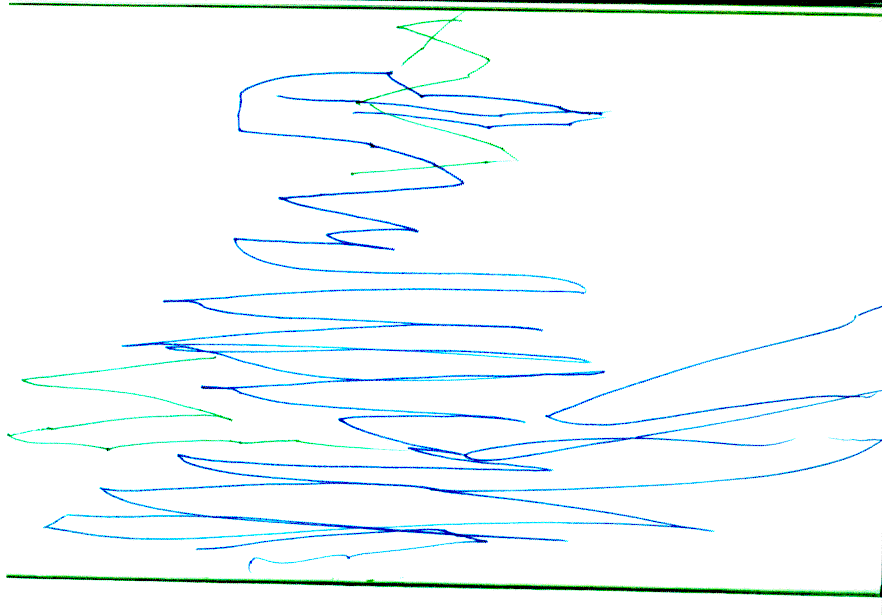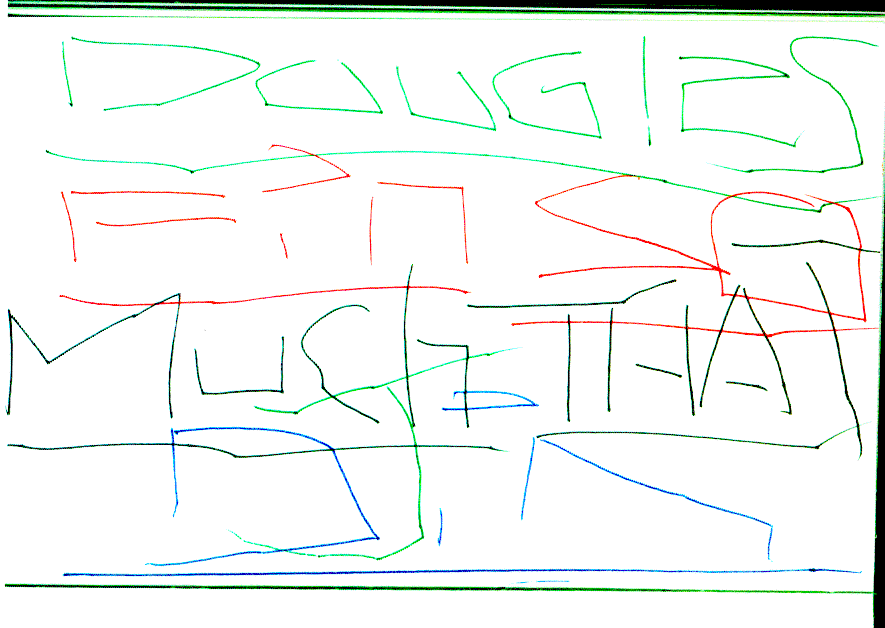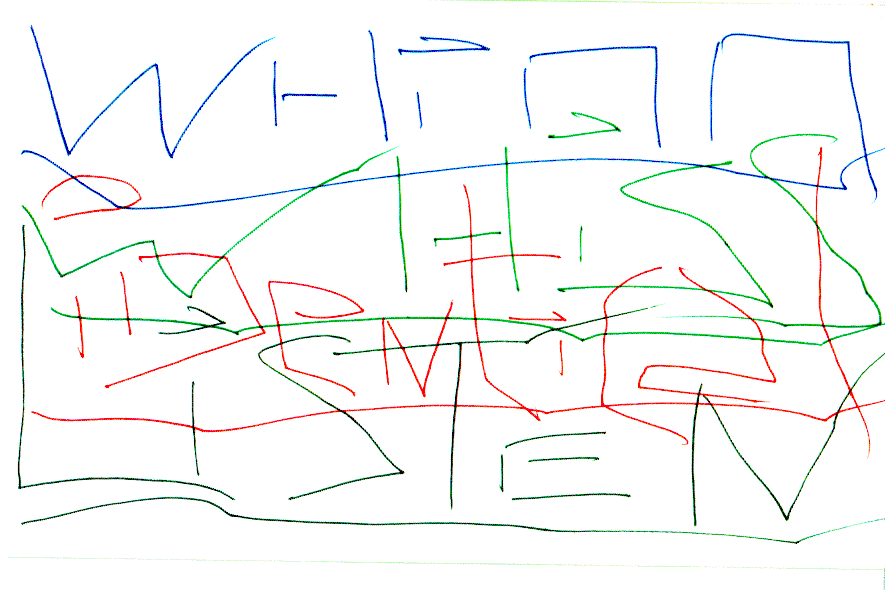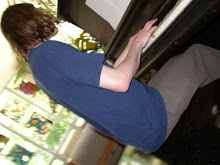Wednesday, December 3, 2008
Shampoo 34
Friday, November 28, 2008
Saturday, November 22, 2008
Meow Meow Performs Laurie Anderson
Meow Meow performs Laurie Anderson's "The Dream Before." (Unfortunately, the video only gives selections of the song, which is one of my favorite songs.)
Thursday, November 20, 2008
The Stone Roses
Anyway, I've decided to, at long last, give their first album a listen. Let's thank the internet for this, the entirety of The Stone Roses:
I Wanna Be Adored
She Bangs the Drums
Waterfall
Don't Stop
Bye Bye Badman
Elizabeth My Dear
(Song for My) Sugar Spun Sister
Made of Stone
Shoot you Down
This Is the One
I Am the Resurrection
And An Extra Song:
Fools Gold
Saturday, November 15, 2008
The Idea of the Alien in Jack Spicer's Dictated Books
Excited about Kevin Killian and Peter Gizzi's new collection of Jack Spicer's poetry, I've been reading everything on Spicer that I can find--Spicer's poems and writing about Spicer's poetry. During one of my searches for writing about Spicer, I found a very large PDF file.
The file comes from Simon Fraser University. Apparently, when John Granger was there in 1982, he wrote his Master's thesis on Jack Spicer. Robin Blaser was part of the committee, and someone took the time to scan all 172 pages of the thesis for digital documentation.
I haven't read the text yet, but I'm delighted and excited, since it's so difficult to find critical writing on Spicer. If you're interested, the file can be found here.
Wednesday, October 8, 2008
Issue 1

Like much of the poetry community, I've discovered that I'm a "contributor" to Issue 1. For anyone who has missed out on all of the brouhaha about this anthology, it's a nearly 4,000 page computer generated work in verse. Each poem in the anthology is roughly one page, and the "editors" of the work have signed each poem with a poet's name. The poets were not told ahead of time that their names would be attached to work they did not write, and there appears to be no relation between the poems in the anthology and the actual works of the poets listed. Issue 1 is, quite simply, a prank.
And it's a prank that has gotten a number of people really angry. The For Godot blog, which produced this anthology, is filled with comments from poets screaming that they didn't write their poems and worrying that their reputations will be compromised. On his blog, Ron Silliman hinted at legal action and posted the home address of one of the contributor's parents.
Personally, I don't think this prank is as layered or intriguing as Kent Johnson's Araki Yasusada, but I'm also not afraid of losing my identity over a joke. If you take a moment to examine Issue 1, you discover that every "contributor" writes with the same voice, and in order for a reader to take this anthology seriously, she would have to believe that Shakespeare wrote a poem titled "Making ceremonies with volubility" or that Thoreau wrote, "Like sauntered blacksmiths/ Like sauntered bobolinks."
I'm amused by the anthology and my inclusion in the anthology, but I don't see it as a powerful critique of authorship, which seems to be a claim being kicked around the internets. It's a prank--enjoyable for a moment but not strong enough to burn down poetic communities or to revise how we go about writing our poems.
And if you are wondering, here's "my" poems in the anthology:
The cool brains
Coming fright
Found
A drunken grave
A brain
Regard
Ravellings turned outside regard
Eternity
Cool dews and
purple sights
Wednesday, October 1, 2008
Review of New European Poets

My review of New European Poets, which was published this year by Graywolf Press, is in the October issue of Gently Read Literature. The review can be read at: Gently Read Literature
Monday, September 22, 2008
Cannot Exist 3

I just received my copy of Cannot Exist 3 in the mail, which includes a couple of my poems. It's a nifty journal, and delightfully Andy Gricevich included the previous issues, including lovely writers like Andrew Zawacki and Lisa Jarnot. (This reminds me: if you haven't read Andrew Zawacki's Anabranch, go get a copy--it's one of the best recent books of poetry I've read this past year.)
Take a look at the lineup, and submissions are open for the next issue.
Issue 3:
Alex Burford
Mark Cunningham
Carrie Etter
Lawrence Giffin
William Gillespie
Kevin Killian
Mark Lamoureux
Bonnie Jean Michalski
Sheila E. Murphy
Andy Nicholson
Dirk Stratton
Cannot Exist
Sunday, September 21, 2008
Holly Woodlawn
Holly Woodlawn has always been my favorites Warhol Superstar, ever since I saw her in Trash. I think what drew me to Holly was that she wasn't immaculate, like Candy Darling, but her appearance was more human and imperferct than that. And also that she her intelligence and sharp humor were always front and center in any interview or any performance--she came to the screen as an entire person, instead of a vapid image, as Joe Dallesandro perhaps did.
But that's too dismissive of what Joe did manage on-screen, which was very enticing and enigmatic--I can't explain, even to myself, what it is about Joe that made him engaging. Instead, let's just celebrate Holly Woodlawn a while longer.
Saturday, September 20, 2008
Exile in Guyville
Below is that album as best as I could construct it, although a few songs don't exist in the land of You Tube. The songs remain beautiful and painful, even in some low-fi formats. It's especially wonderful to listen to "Fuck and Run" again--I forgot how tragic Phair's voice sounds as she strains beneath her vocal range into the awkward whisper of "I want a boyfriend/ I want a boyfriend."
We might never see this Liz Phair again, but let's remember here she was an artist to admire.
6'1"
Help Me Mary
Glory
Dace of the Seven Veils
Never Said
Explain It to Me
Canary
Mesmerizing
Fuck and Run
Girls! Girls! Girls!
Divorce Song
Flower
Stratford-on-Guy
Strange Loop
Peter, Bjorn & John
Young Folks
Objects of My Affection
Monday, September 15, 2008
Taylor Mead
So, in an attempt to pretend that I'm not envying the citizens of San Francisco, I've been watching a few You Tube videos of Taylor Mead this week. Highlights include...
Taylor Mead reading his poem "Song to Jake Gyllenhall" at The Bowery
Taylor Mead remembering Jackie, Candy, and Hollie. Apparently they all went to poetry readings back then. My week is made.
An interview with Taylor Mead.
A preview of Excavating Taylor Mead, a documentary about Taylor Mead that will be shown at the Yerba Buena Center on Sunday, September 21.
Saturday, September 13, 2008
What Happens in a Poem

I recently found the You Tube videos from the Philoctetes Center--a series of multidiciplinary discussions about imagination, sponsored by the New York Psychoanalytic Society and Institute.
Although a number of the discussions look interesting, the one I'd like to point out is the roundtable discussion "What Happens in a Poem." The panel consists of Michael Braziller, Timothy Donnelly, Anne-Marie Levine, David Pollens, Alice Quinn, and David Shapiro, and each panelist presents a reading of a poet.
The poets who are read/discussed are Elizabeth Bishop, Cavafy, ee cummings, Wallace Stevens, Vincent Andres Estelles, and Frank O'Hara.
If you only have a few moments, fast forward to the beautiful discussion of Estelles--the contributions of the Catalonian Modernists remain painfully unaknowledge, by large--and Shapiro's tender reading of O'Hara's "To the Harbormaster."
The embedded video has been disabled by request, but the video can be found at: http://www.youtube.com/watch?v=fkF6JHwGbp0
Wednesday, August 20, 2008
BlazeVOX Raffle and Bake Sale

The small press publisher BlazeVOX needs your help! (And my help!) According to Geoffrey Gatza, their publisher, the press is $4000 in debt. And the solution? Bake sale and raffle!
BlazeVOX is a wonderful little press, and I would like to see them hang around. Let's say you and I go buy some food and raffle tickets: http://www.blazevox.org/bakesale.htm
Thomas Nozkowski

What to say about Thomas Nozkowski?
I found out about Nozkowski through John Yau's art criticism--Nozkowski is a painter Yau especially loves and a painter with whom Yau collaborated for the book Ing Gring. Nozkowski makes astounding abstract paintings. The paintings are usually small--neither the height nor the width of the two paintings below, for example, passes 30 inches--which Nozkowski has connected to political and economic reasons: the art market tends to see "major" works as large works, so Nozkowski explores the intimate, personal size that the market pushes aside.
.jpg)
.jpg)
And Nozkowski's method emphasizes a long ongoing process with the work. He keeps his unfinished painting in his studio, and over a period of years will work on each painting. He will take a painting out every now and then and find some way to "bring it into play," by adding a mark that doesn't work with what already exists in the painting, covering the existing painting with a wash, or some similar means to make the canvas active again. Over the years he will continue the process of bringing the painting into play and reworking it--until he intuitively feels that the work is done.

Nozkowski's method is one aspect of his work that interests me. I wonder what the work would look like if there were a record of it at each "finished" stage, each moment before the painting is reactivated. I imagine a narrative where each work shades the next work in the series, where each work is separate and waits to be marred so the next work can be built.
But the work, as it stands, astounds me. The strange shapes, the unresolved shifts between background and foreground, and the frequent refusal of balance gives these paintings a challenging, exciting rhythm. I try to imagine what can be done in abstract painting in the future and today that will still feel relevant. Often, it's difficult--much new abstraction I can find is stale, distant. But Thomas Nozkowski's work asserts the relevance of abstraction. His work is alive, vibrant, and intimate.


Monday Night Lit
Wednesday, August 6, 2008
Jan Pieterszoon Sweelinck
Malle Sijmen:
Sweelinck on a Virginal Harpsichord (Toccata XVI):
Thursday, July 24, 2008
Review in Galatea Resurrects
Wednesday, July 16, 2008
Thursday, July 10, 2008
Monday, July 7, 2008
America: a Prophecy


Early this month, I read Blake's America: a Prophecy. With the fourth of July arriving and the war continuing, it seemed to fit the moment.
I've loved Blake since my mid-teens: The Book of Urizen was the first of the prophetic books that I read and it was a major text from that time in my life. The prophetic books attracted me as someone entering writing, I think, as Blake's vision enwraps like a dream does, and they attracted me spiritually, as the demiurge styled Urizen--a vain Old Testament god--was unlike anything I had come upon in conventional Christianity and Blake's rewriting of Genesis gave myth a life I had never before experienced.
Since Urizen I've read a number of other prophetic books, but I hadn't gotten around to reading America before. I'm not sure why--it's one of the more famous prophetic books, it's a quick read (so time is no excuse), and from second-hand accounts, I expected it to be a powerful text. It might be that the text connects to Blake's work about the other continents, and reading across the world is a more daunting task. Or maybe it's that I'm nervous about historical prophecy.
But if historical prophecy has, in the past, kept me from reading America, this month it urged me toward it. I've been trying to think through a segment of Robert Duncan's essay "Changing Perspectives in Reading Whitman":
The oracular mode enters poetry and history where profound contradictions come
into play. In the widening of what we call the credibility gap, incredible
transformations may come into the statement of truth. Oracles are to be read
many ways or both ways.
I take Duncan to mean that there are specific historical moments when it is possible to make truth statements that don't function like traditional truth statements--one cannot say that they are either true nor false. This may be possible through the traditional Hegelian dialectic; when there is conflict, war, a strong pull between two established designs for the world (thesis/antithesis, north/south), it is possible for a third voice to make an oracular statement. As in the Hegelian synthesis, this third voice neither affirms nor denies the prior voices and this third voice is not even possible (or at least comprehensible) without the passing of the prior voices. The third voice is oracular, insofar as it imagines the whole of the conflict and imagines beyond the conflict; the statement moves toward its own possibility and into its own comprehensibility.

America does imagine the whole of the conflict. The necessity of rebellion is affirmed and argued for, but the violence of rebellion appears as a dangerous fire, a fire that consumes and continually threatens to rage beyond any control. Orc, the figure of rebellion, arrives as demonic, and while Blake champions the desire and freedom of Hell, here he recognizes the danger that can/will come (historically, the even bloodier French Revoloution).
Does America imagine beyond the conflict of the American Revolution? I think it does, but I'm still trying to understand how. America isn't purely about the American Revolution--Blake is trying to describe the action of control and resistance and show the Revolution as the enactment of a type of movement. But I'm sure there's more. I might still be at a loss because I haven't seen the movement, the motion in it's entirity: it's preceeded by Africa (in The Song of Los) and followed by Europe.
I'm continuing to consider Duncan's thoughts on oracle. I wish that more writers were thinking about this mode, either in Duncan's conception or in some other manner. I remain nervous about oracular claims, as the obvious danger of hubris and moral superiority sit with such statments. I imagine these dangers put off other poets as well.
But fear doesn't mean the oracular mode shouldn't be considered (just as the consideration doesn't mean a blank check should be given to all fortune telling). As a way to engage with the world, with events in the world and as a way to engage with history through a full imaging of possiblity instead of simplistic moralizing, the oracular mode shouldn't be abondoned, even if it needs to be radically re-envisioned for contemporary society.


Kiki Gallery
Over on Denis Cooper's blog, Kevin Killian has posted memories about the Kiki Gallery from San Francisco back in the 1990's. Kevin is running a show in San Francisco about the gallery from now until August 2. If you're in the area, make me jealous and go to the show.
Read Kevin's post here.
Monday, June 30, 2008
Oranges & Sardines

If you haven't yet had a look, check out the summer issue of Oranges & Sardines with poetry co-edited by David Krump and me. The issue includes poetry, articles, and visual. I'm delighted to have in it poets I have adored for a long time (such as Dana King and Steffi Drewes), excellent poets I learned about through the editorial process (such as Blake Butler), and I hope you take a look at the editorial letter for a sense of the shared poetics of David and me--I do think the letter is a strong gesture.
Please, have a look:
Oranges & Sardines
Thursday, May 22, 2008
Two Pieces by Olivier Messiaen
"Feuillet inédits"
Organ Improvisation
Wednesday, May 21, 2008
Superflat (with Takashi Murakami)
 When I was at the Toledo Museum of Art a couple of weeks ago, I saw this scupture--"Mr. Wink (Oval Sitting atop a Cosmos Ball)." The piece, as I'm sure is evident, is plastic, and the Cosmos Ball includes a CD by the band Zak Yumiko.
When I was at the Toledo Museum of Art a couple of weeks ago, I saw this scupture--"Mr. Wink (Oval Sitting atop a Cosmos Ball)." The piece, as I'm sure is evident, is plastic, and the Cosmos Ball includes a CD by the band Zak Yumiko.Murakami is best known as the prime mover behind Japan's Superflat movment and as the artist who created the cover art for Kanye West's album Graduation (oddly enough, the only of Kanye's albums I don't own). I've come across Murakami's work a few times via internet, and while I may have seen an exibition of his in San Francisco--it was either Murakami or an artist related to Superflat--it was seeing this piece in person that got me thinking about his work.
"Mr. Wink" falls in with a number of Murakami's plastic figurine work. Some of these pieces follow "Mr. Wink" in terms of being child-like, intentionally comercial, and blindingly colorful:

But then, other work of Murakami's takes the most vapid elements of anime's style, and rather than ephasizing their commerciality, deforms them into the grotesque, the overly sexual:



I've been wondering if a similar aesthetics is possible in writing, and if it is possible, what it might look like. The closest that I can think of is the twisting blank narratives of Daniil Kharms and John Yau. Both are nearly as colorful as Superflat, both are nearly as sharp, but I can't think of a writer whose textual surface nears this plastic.
I'm uncertain if work like this could be done in writing. While commercials and movie dialogue may be as financially dependant as the style Murakami works from, I can't think of a type of writing that is displayed in housholds, that could hold the status of decoration.
Ideas, anyone?
Monday, May 5, 2008
Stan Brakhage


 Instead of reading his poems, he shows slides of poems like the ones above and tries to talk about them, focusing especially on the process of reading or deciphering the handwriting itself. I had heard about Grenier's presentations of his poems, but the "reading" at Yerba Buena was my first opportunity to see Grenier in person.
Instead of reading his poems, he shows slides of poems like the ones above and tries to talk about them, focusing especially on the process of reading or deciphering the handwriting itself. I had heard about Grenier's presentations of his poems, but the "reading" at Yerba Buena was my first opportunity to see Grenier in person.I went with a few friends from graduate school--I think I was the only one there who knew Grenier's work, it was my idea to go--and when we got there, we discovered that the other half of the night's bill was a showing of some of Stan Brakhage's films. I had never seen them, and I didn't know who Stan Brakhage was.
The films were something of a revelation. In their refusal to give narrative, to give a static image to hold on to, they made me aware of time in the way that Gertrude Stein's unfolding grammar made me constantly aware of the present time. In both there is no place to rest, so the "now" of time is insistant, is constantly asserting itself.
And in both there is a depth of emotion. While much "experimental" work falls away from me and is forgotten, work like Brakhage's films remains with me, close to me. More and more, I believe it is because of this emotion and this care on which Brackhage's abstract films are built. I do want work that pushes and breaks the norms of genre, but I want it to retain a fullness of humanity. Brakhage's films are beautiful.
San Francisco Reading
Details: here.
Thursday, May 1, 2008
Moria
Saturday, April 12, 2008
Name Checked, Yo
here
I need a friendly looking dog to put on my blog.
Monday, March 31, 2008
Sunday, March 23, 2008
Black Robert Journal
Monday, January 14, 2008
Review of Earthlight
Coming in at nearly 300 pages and starting with Breton's intentionally abrasive Dada poetry, this might not be the best place to start reading Breton. (Mary Ann Caws' book might be a better introduction.) However, if the size is uninviting for an unfamiliar reader, it is the opposite for a reader who is already interested in Breton's work.
The poems and sequences are here in their entirity, a rarity in the world of published translations, where shortened sequences and fragments of books are usually preferred.
The trajectory of Breton's writing and the range of Breton's writing might be discussed in a full review of this book, but in these few short notes, I must be selective.
What made me sit down and write about this book was my experience rereading the sequence The Air of the Water. This sequence of fourteen untitled poems startled me with their vitality:
I dream I see you endlessly superimposed upon yourself
You're sitting on the high coral stool
In front of your mirror always in its first quarter
Two fingers on the water wing of your comb
And at the same time
You're returning from a journey you're lingering the last one left in the grotto
Streaming with lightning
You don't recognize me
For all the poets interested in film techniques like montage, Breton's subtle understanding of how film techniques can be applied to poetry remains without peer. In this selection, for example, he uses the simultaneity of superimposition to make montage coexistant with narrative and then contrasts the multiplicity of superimposition with the singularity of the speaker's voice.
These poems as exciting as the current poetry of David Shapiro and John Yau, and a reader could gain a lot reading the three poets side by side. With this book in stores and a reprint of Mary Ann Caws' and Jean-Pierre Cauvin's Poems of Andre Breton in circulation, hopefully Breton's poetry (as opposed to his pronouncements, essays, and novels) will garner more attention.
Now if only someone could convince David Antin to collect his translations of Breton...
Review of Broken World
If Lease's article shows him championing the possibilities of the lyric "I"; through a critical mode, then Broken World shows his ongoing demonstration of everything that is possible for the lyric "I" today.
Lease's poetry ranges from the luminous abstraction of "Cy Twombly" to the breathtaking elegy of "'Broken World' (For James Assatly)" to the rhythmically driving long poem "Free Again," a poem that itself skillfully holds close a wide range of precedents (from Ginsberg's "America" to William's Spring and All to Shaprio's "A Man Holding an Acoustic Panel").
Let me highlight a section from "Free Again":
my handwriting, stories, Paul
Celan, phrases--
on the back of
a recipt--
somewhere
I made
the words--angry
enough--pit--
hot--pit--
our
cheap history
keeps smiling--
"you've been disliked
for three thousand years:
do you ever look in the mirror--"
At a time where experimental poetry is filled with platitudes about how laguage is non-referential, Lease pulls us from that solipsism brings us back to Paul Celan, whose experimentations and deformations of the German language were born out of a need to respond the the societal trauma of the Holocaust.
Only an "I" that can fracture, that can emote, that can hold multiplicities within it will be able to respond to the horrors of the twentieth century and the lived experience of the twenty-first century (lived both as an individual and as a citizen). This poetry is tough. This poetry is tender. This poetry meets the demands of a harsh but beautiful world
About this Blog
At this point, I'm planning on keeping this blog very simple. Short reviews, poetry resources, and maybe a few comments on poetics.
